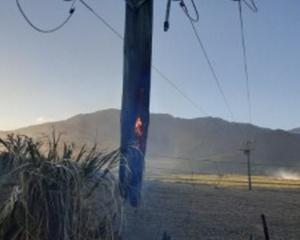The family of a 13-year-old boy left unconscious and bleeding this week with a hole in his lip say someone will die if young people continue playing a schoolyard game that causes blackouts.
The Auckland boy had surgery to repair his lip after a tooth sliced through it when he was released unconscious from a sleeper hold and fell on to concrete.
In the game, called "headlocking'', students are held in a wrestling-style sleeper hold until they black out.
A medical expert says the game could be fatal, and a principal believes students intent on pushing the boundaries are not getting the message.
At least two young people have died in the past three years after similar "choking'' games.
Abbas Alethary took part in the headlocking game before class at Selwyn College on Wednesday, and started to bleed from the nose and mouth.
He said he "tapped out'' to tell the other boy to let him go.
"The guy did it really hard and didn't stop and I started bleeding out of my nose and mouth. One of my friends said, `Stop it, he's unconscious,' and I fell straight to the ground.''
Abbas could remember being scared and saying he had had enough. His next memory was of walking around, dazed and bleeding.
He was taken to a doctor with a broken nose, broken teeth and a wound where his tooth went through his lip. He later went to the Starship hospital for treatment.
Abbas said the headlock game wasn't usually taken seriously, and he did not think many students understood its possible consequences.
"I could have passed away, '' he said.
Some students at Selwyn had started playing the game in recent weeks.
Abbas' brother Yarb Alethary, 27, said he would meet college officials, the other student and police today.
"I don't want it to happen to anyone else ... This is not a game, it is absolutely not a game.
"If this is not dealt with it will happen again and again. Someone will get killed if it's left like this,'' Mr Alethary said.
Selwyn College principal Sheryll Ofner said the matter was being taken seriously.
"The two students involved in this had a level of co-operation,'' she said.
It was alarming that students were mimicking what they saw on television "without realising the consequences'', Ms Ofner said.
It's understood the boy who held Abbas in the headlock has been suspended for three days. Ms Ofner said the punishment would send a clear message to others that the behaviour would not be tolerated.
Secondary Schools Principals Association president Patrick Walsh said it was difficult to prevent activities such as headlocking.
"Teenagers are prone to experiment and push the boundaries and take risks,'' he said.
"We've seen that in a number of crazes, from the choking games to planking to experimenting with drugs and alcohol, so I don't think it's going to go away any time soon.''
It had been discussed by principals, as had the emergence of social media such as Facebook and Twitter, which enabled teenagers with smartphones to spread messages and information quickly and easily.
Mr Walsh said that after the death of a teenager in the Bay of Plenty, the coroner had said the best thing was to talk about choking games to raise awareness that they were dangerous and inappropriate.
"But the other side of it is that the more you talk about it, students who aren't aware of it are more inclined to say, `We'll give that a go.' It's difficult to know whether you say nothing or, as the coroner suggests, discuss it and make it a wider issue.''
Neurological Foundation medical adviser Jon Simcock said that when bloodflow to the brain was blocked, it resulted in unconsciousness and could be fatal.
"It's very dangerous - you can tear and damage arteries like that.''
It could also cause a clot in the artery that could lead to a stroke.
"I don't think they would understand how dangerous [it can be].''
The chances of something serious happening were small, Dr Simcock said, but it was hard to understand why people would perform such acts when a risk existed.
The sleeper hold and choking games had been around for decades, he said.
Last year, Rotorua coroner Wallace Bain recommended that the Ministries of Heath and Education begin a programme to educate teachers and parents on warning signs and how to help at-risk young people.
That was in response to the 2009 death of the Bay of Plenty teenager, who choked himself to death. His identity is suppressed.
Police believed that rather than trying to end his life, the boy was experimenting to see how far he could push himself until he started feeling light-headed.
A similar "choking game'' killed a 12-year-old Papakura girl in November 2010.
Another girl was involved in a similar incident the same day, but survived.
- Andrew Koubaridis of the New Zealand Herald











